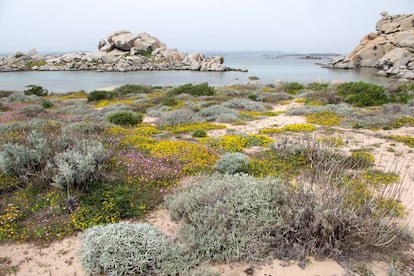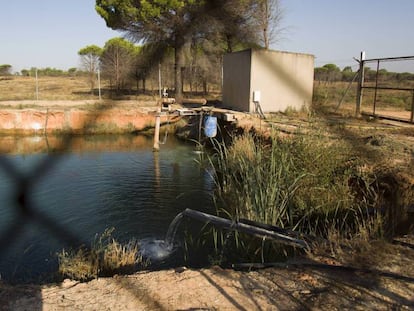Southern Spain facing desertification if CO<sup>2</sup> emissions not brought down
New report suggests that the Mediterranean basin will face massive changes in just a lifetime
The narrow green strip running along the north of Africa will disappear, devoured by the desert. The forests will end up confined to the highest hilltops. And a third of Spain will be as arid as the desert of Tabernas, in Almer¨ªa, is today. All of this will happen if CO2 emissions are not reduced. That¡¯s not some kind of biblical prediction, but rather the conclusions of a recent study about the impact of climate change on the Mediterranean basin ¨C an area that has barely changed in 10,000 years could be radically altered in the space of just a human life.

¡°Even if the objectives of the Paris Agreement are met, Mediterranean landscapes will change, and the dryer biomes will advance toward the north,¡± says Joel Guiot, a French researcher from the European Centre for Research and Teaching in Geosciences (CEREGE). At the latest climate change summit, in December 2015, 195 countries committed to keeping global temperature rises between 1.5?C and 2?C by the end of the century. ¡°If not, the changes will be greater and a higher proportion of areas will be affected compared to any other period in the last 10,000 years,¡± he adds.
While the global thermal rise has been 0.85?C, countries in the Mediterranean basin have gone up by 1.3?C
Guiot, a paleoecologist, last year published a complete reconstruction of the Mediterranean area during the Holocene, the current geological age, which was born after the last great glaciation and has borne witness to the rise of humans. To do so, he utilized tens of thousands of pollen samples trapped in sediments. ¡°Pollen offers a unique archive of the historic dynamic of vegetation,¡± he explains.
Together with his colleague Wolfgang Cramer, Guiot has modeled how the different Mediterranean landscapes will look by the end of the century. The results, published in the journal Science, have once again confirmed a trend that had been seen in previous studies: the Mediterranean zone will warm up more than the global average. Since the industrial revolution, while the global thermal rise has been 0.85?C, countries in the Mediterranean basin have gone up by 1.3?C. Another of their conclusions confirms that the unusually high averages seen this century so far had never been registered during the Holocene.
As for the future of Mediterranean forests, the study shows that even if the Paris goals are met, trees and other vegetation would be confined to higher-altitude areas and the north. Only a temperature fall of 1.5?C would see the Mediterranean stay as it is now.
An increase of 4?C would be a huge change, like bringing Casablanca to Madrid
University lecturer Jos¨¦ Manuel Moreno Rodr¨ªguez
The worst-case scenario predicted by climatologists over the coming century is a concentration of CO2 that is three times higher than the current level of 400 parts per million, and a rise in average temperatures of over 4?C. In that case, the southern third of Spain would be dominated by an arid landscape.
¡°If the Paris goals are met, we would see a temperature rise of close to 3?C, which would mean significant changes in our environment,¡± explains Castilla-La Mancha University lecturer Jos¨¦ Manuel Moreno Rodr¨ªguez. For this ecologist, who is one of the Spanish researchers from the UN¡¯s Intergovernmental Panel of Climate Change Experts, ¡°an increase of 4?C would be a huge change, like bringing Casablanca to Madrid.¡±
English version by Simon Hunter.
Tu suscripci¨®n se est¨¢ usando en otro dispositivo
?Quieres a?adir otro usuario a tu suscripci¨®n?
Si contin¨²as leyendo en este dispositivo, no se podr¨¢ leer en el otro.
FlechaTu suscripci¨®n se est¨¢ usando en otro dispositivo y solo puedes acceder a EL PA?S desde un dispositivo a la vez.
Si quieres compartir tu cuenta, cambia tu suscripci¨®n a la modalidad Premium, as¨ª podr¨¢s a?adir otro usuario. Cada uno acceder¨¢ con su propia cuenta de email, lo que os permitir¨¢ personalizar vuestra experiencia en EL PA?S.
En el caso de no saber qui¨¦n est¨¢ usando tu cuenta, te recomendamos cambiar tu contrase?a aqu¨ª.
Si decides continuar compartiendo tu cuenta, este mensaje se mostrar¨¢ en tu dispositivo y en el de la otra persona que est¨¢ usando tu cuenta de forma indefinida, afectando a tu experiencia de lectura. Puedes consultar aqu¨ª los t¨¦rminos y condiciones de la suscripci¨®n digital.











































